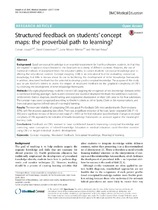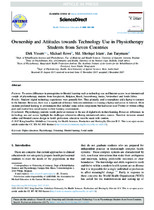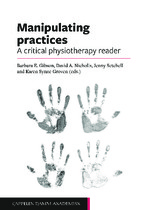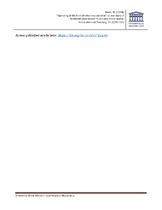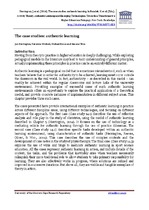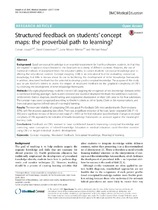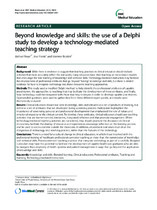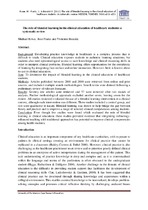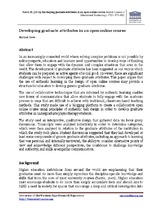Search
Now showing items 1-10 of 18
Structured feedback on students’ concept maps: the proverbial path to learning?
(BMC, 2017)
BACKGROUND: Good conceptual knowledge is an essential requirement for health professions students, in that they
are required to apply concepts learned in the classroom to a variety of different contexts. However, the use ...
Ownership and attitudes towards technology use in physiotherapy students from seven countries
(Elsevier, 2017)
PURPOSE: To assess differences in prerequisites to blended learning such as technology use and Internet access in an international sample of physiotherapy students from Bangladesh, Belgium, Brazil, Luxembourg, Sudan, ...
A critical pedagogy for online learning in physiotherapy education
(Cappelen Damm Akademisk, 2018)
In order to graduate physiotherapy students who are able to thrive in increasingly complex health systems, professional educators must move away from instrumental, positivist ideologies that disempower both students and ...
"Operating at the limit of what was possible": A case study of facilitator experiences in an open online course
(James Nicholas Publishers, 2018)
The experiences of course facilitators in connectivist-type MOOCs are poorly reported. Yet there is evidence that the values and beliefs of facilitators have an important impact on the learning experiences of participants, ...
The case studies: authentic learning
(Routledge, 2014)
Moving from theory to practice in higher education is deeply challenging. While
exploring pedagogical models in the literature may lead to tacit understanding of
general principles, actually implementing these principles ...
Structured feedback on students’ concept maps: the proverbial path to learning?
(BMC, 2017)
Good conceptual knowledge is an essential requirement for health professions students, in that they are required to apply concepts learned in the classroom to a variety of different contexts. However, the use of traditional ...
Student and staff perceptions and experiences of the introduction of Objective Structured Practical Examinations: a pilot study
(Health and Medical Publishing Group, 2013)
Background. The Objective Structured Practical Examination (OSPE) is widely recognised as one of the more objective methods of assessing practical skills in healthcare programmes, including undergraduate physiotherapy ...
Beyond knowledge and skills: the use of a Delphi study to develop a technology-mediated teaching strategy
(BioMed Central, 2013)
Background: While there is evidence to suggest that teaching practices in clinical education should include activities that more accurately reflect the real world, many educators base their teaching on transmission models ...
The role of blended learning in clinical education: A systematic review
(Association for Medical Education in Europe, 2012)
BACKGROUND: Developing practice knowledge in healthcare is a complex process that is difficult to teach. Clinical education exposes students to authentic learning situations, but students also need epistemological access ...
Developing graduate attributes in an open online course
(Wiley, 2016)
In an increasingly connected world where solving complex problems is not possible by solitary experts, educators and learners need opportunities to develop ways of thinking that allow them to engage with the dynamic and ...

